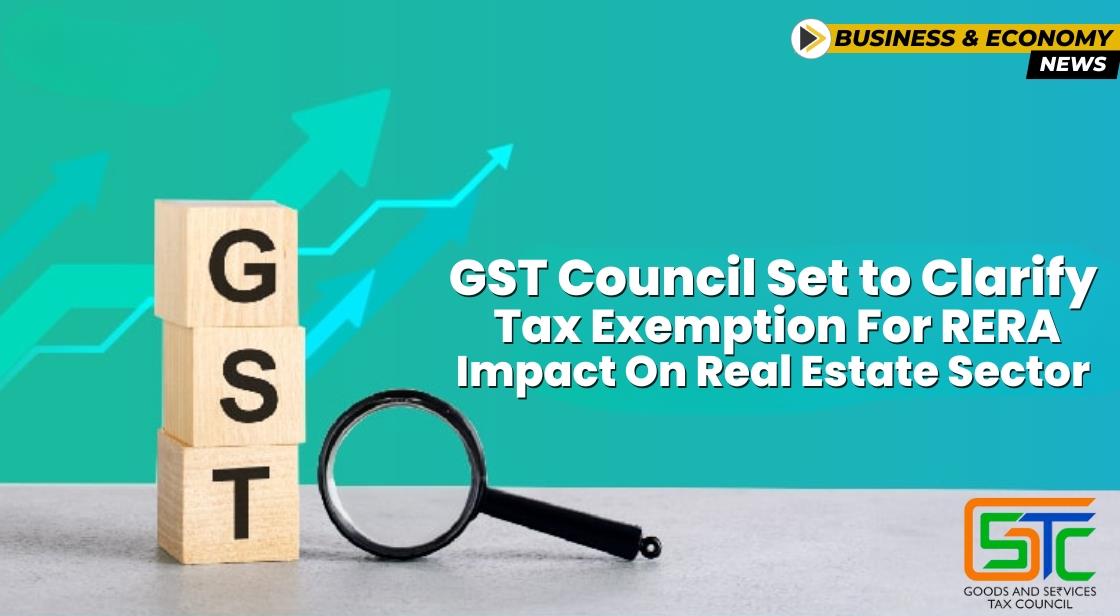GST Council Set to Clarify Tax Exemption for RERA; Impact on Real Estate Sector

News Synopsis
The GST Council is anticipated to provide clarity that the Real Estate Regulatory Authority (RERA) will not be subjected to Goods and Services Tax (GST), a move that could have significant implications for the real estate sector. The regulatory body, established in various states to ensure transparency and consumer protection in real estate projects, is expected to be exempted from GST, considering its funding structure and functions.
The GST Council is on the verge of providing clarification regarding the exemption of Goods and Services Tax (GST) for the Real Estate Regulatory Authority (RERA), according to a report by news agency PTI. This move aims to streamline tax regulations in the real estate sector and provide relief to RERA bodies.
Key Points:
RERA Function and Purpose:
The Real Estate Regulatory Authority (RERA) serves as a regulatory body for the real estate sector, ensuring transparency in real estate projects, safeguarding consumer interests, and facilitating speedy dispute resolution.
Exemption Decision:
Following discussions with RERA functionaries regarding their operational nature, it has been concluded that GST is not applicable to RERA bodies. This decision is based on the understanding that RERAs are funded by respective state governments, and imposing GST would essentially amount to taxing state governments.
GST Council Clarification:
The GST Council, chaired by the Union Finance Minister, is expected to convene a meeting before the imposition of the Model Code of Conduct for the upcoming general election scheduled for April-May. This clarification is anticipated to be addressed during the meeting.
Previous Regulatory Exemptions:
Prior to July 2022, certain services provided by key regulatory bodies such as the Reserve Bank of India (RBI), Securities and Exchange Board of India (SEBI), and Insurance Regulatory and Development Authority (IRDA) were exempt from GST. However, this exemption was lifted on July 18, 2022, prompting discussions about the tax implications for RERA bodies.
Impact on Real Estate Sector:
Rajat Mohan, Executive Director of accounting and advisory firm Moore Singhi, highlighted the potential benefits of excluding RERA authorities from GST considerations. Notably, in the residential real estate sector, Input Tax Credit (ITC) is not permissible. Therefore, clarifying the GST exemption for RERA bodies could lead to reduced expenses for developers and homebuyers.
What is Real Estate Regulatory Authority (RERA)?
The Real Estate Regulatory Authority (RERA) is a regulatory body established by the Indian government under the Real Estate (Regulation and Development) Act, 2016. It functions at the state level to ensure transparency, accountability, and protection of consumer rights in the real estate sector.
Here's a breakdown of RERA's key functions:
-
Regulating real estate developers and agents: RERA sets guidelines and ensures developers adhere to ethical practices, transparent transactions, and timely project completion as per the agreed-upon plans and specifications.
-
Protecting homebuyers' interests: RERA establishes an adjudicating mechanism for speedy and efficient resolution of disputes between homebuyers and developers. This protects homebuyers from unfair practices and delays.
-
Promoting transparency: RERA mandates developers to register their projects and share all relevant information about the project, including land title, approvals, construction plans, and schedules, with the authority. This information is also made publicly available on RERA's website, allowing for greater transparency and informed decision-making by potential buyers.
-
Ensuring financial discipline: RERA requires developers to deposit a percentage of the project funds into a separate bank account to ensure that the money is used solely for project development and completion. This mitigates the risk of financial mismanagement and project delays.
Overall, RERA plays a crucial role in safeguarding the interests of homebuyers, fostering ethical practices in the real estate sector, and promoting a more transparent and responsible real estate market in India.
You May Like









